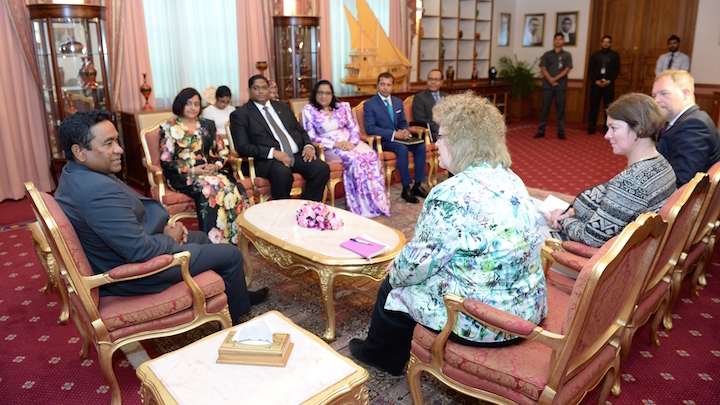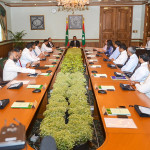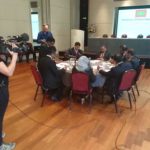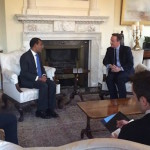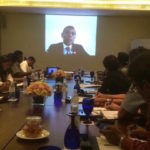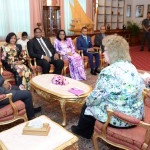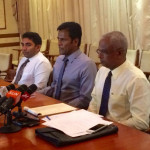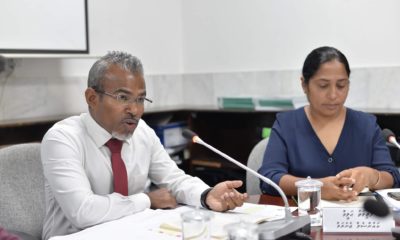The European Union will consider imposing targeted sanctions on top Maldivian officials if the government does not release political prisoners and engage in dialogue with political parties, a visiting delegation from the European parliament said today.
Speaking to the local press, Richard Howitt, MEP and vice president of the delegation, said “genuine inter-party talks” should take place with an agreed timetable and an international mediator if required.
Noting that the UN has offered to mediate all-party talks, Howitt said the talks should focus on agreeing upon steps “to begin work to restore the political space, freedom of expression, and freedom of assembly which are today absent.”
“That dialogue cannot take place whilst political leaders are in detention. All leaders should be free to engage and the public must be informed. There is no chance that elections that are due to place here in 2018 will be rated as free and fair by Europe or the international community unless these steps start and start now,” he said.
President Abdulla Yameen’s administration has remained defiant in the face of international criticism and diplomatic pressure to resolve the year-long political crisis sparked by the imprisonment of former Defence Minister Mohamed Nazim and former President Mohamed Nasheed in early 2015.
However, faced with the threat of sanctions after a UN rights panel declared Nasheed’s jailing arbitrary, the government last month authorised a 30-day medical leave for the opposition leader to undergo surgery in England after a concerted lobbying effort by India, Sri Lanka, UK, and US.
Howitt meanwhile noted that a resolution adopted by the European parliament in April last did not include calls for members states to impose sanctions to secure the release of jailed politicians.
However, a second resolution passed in December with an overwhelming majority called on member states “to introduce restrictive measures in the form of targeted sanctions to freeze the assets abroad of certain members of the Maldivian government and their leading supporters in the Maldivian business community, and to impose travel bans on them.”
Referring to ruling party-sponsored legislation on criminalising calls for sanctions, Howitt urged the government to “take actions which remove the need for such sanctions to be considered.”
While targeted sanctions might not be imminent, Howitt said the second resolution represented “a very clear political signal that they are now being seriously considered in a way that they weren’t being seriously considered before.”
Howitt stressed that “Europe does not support any one party or one politician in the Maldives politics.”
“We do point to the legal shortcomings in the case of President Nasheed. But our concern is for the apparent lack of independence of the judiciary and lack of respect for international standards of law in many cases in the Maldives, forming a pattern which suggests that this is being used as a deliberate tool for the treatment of political dissent and opposition,” he said.
The EU is also concerned over the cases of former Vice President Ahmed Adeeb and Adhaalath Party president Sheikh Imran Abdulla as well as the lack of progress in the investigation into the disappearance of journalist Ahmed Rilwan, he said.
Jean Lambert, the head of the delegation, said the MEPS “had some very frank discussions, not only with ministers but with political parties, where we’ve discussed a number of issues around the functioning or non-functioning of a multi-party democracy.”
She said the delegation spent Monday afternoon in prison: “It seems to be something that many politicians do these days is spent time in prisons.”
Meanwhile, following meetings with the MEPs as well as a visiting delegation from the Commonwealth Ministerial Action Group on Sunday, President Yameen reiterated his stand that the Maldives must “seek local solutions for local problems”.
“However, we must listen to what foreign parties who work with us have to say. But if the solutions they propose are burdensome and difficult within the bounds of our laws, we must have the courage to respectfully say no. This is the way I’ve chosen,” he said at the opening of a new artificial beach in Malé Sunday night.
Yameen has repeatedly slammed alleged meddling in internal affairs by Western powers – which he said poses a threat to Maldivian independence, sovereignty, and religious unity – and had previously declared that his government would not bow to foreign pressure and release the opposition leader, insisting that Nasheed must exhaust the domestic appeal process.
The state’s appeal of Nasheed’s terrorism conviction is now before the Supreme Court. The former president was found guilty of ordering the abduction of a judge and sentenced to 13 years in prison last March.
Nasheed has said that he intends to the return to the Maldives and challenge Yameen in the 2018 presidential election. But the opposition leader will only be able to contest the election if the apex court overturns his terrorism conviction.

